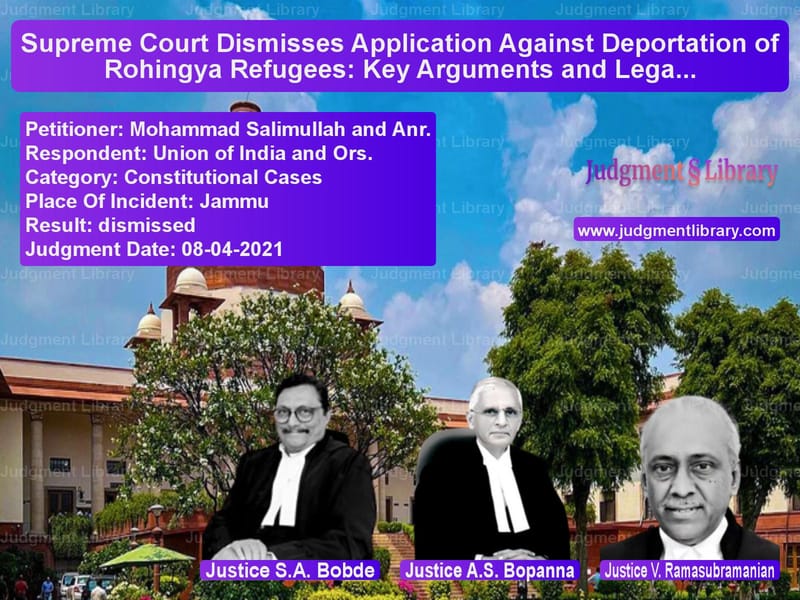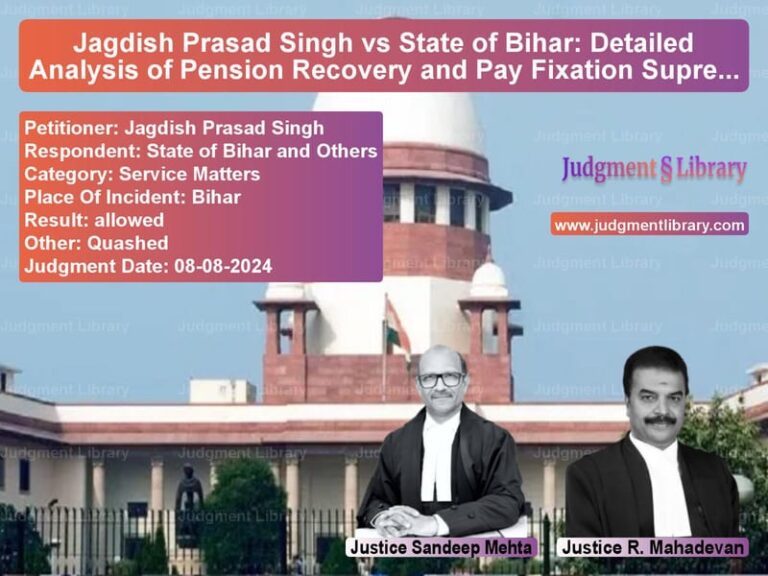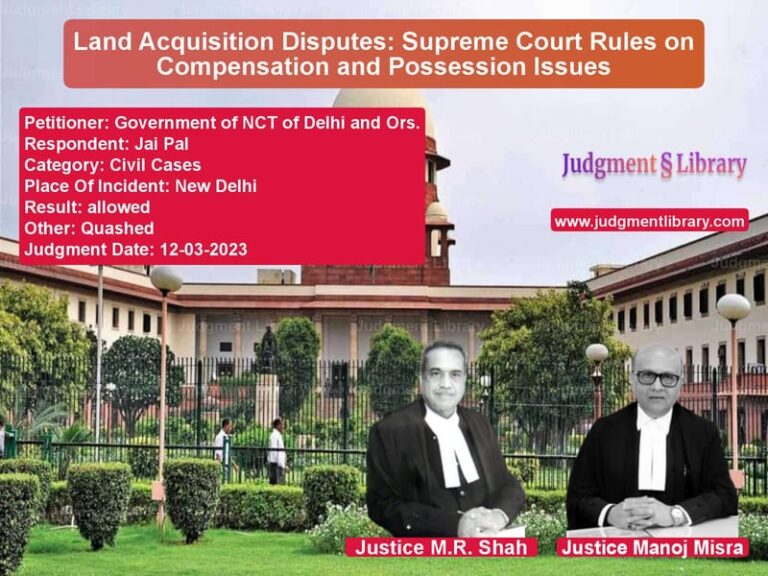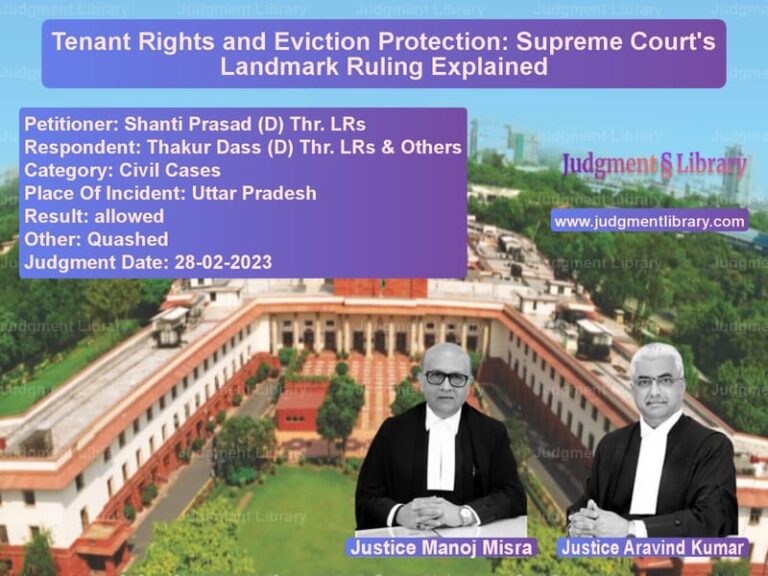Supreme Court Dismisses Application Against Deportation of Rohingya Refugees: Key Arguments and Legal Implications
The Supreme Court of India recently ruled on an interlocutory application filed in the matter of Mohammad Salimullah and Anr. v. Union of India and Ors., regarding the deportation of detained Rohingya refugees. The petitioners, both Rohingya refugees, had filed a writ petition seeking basic human amenities and protection against deportation back to Myanmar. Their appeal focused on the implementation of non-refoulement, a principle that prohibits the deportation of refugees to a country where they face serious threats to their life or freedom.
Background of the Case
The petitioners, Mohammad Salimullah and another individual, approached the Supreme Court seeking a writ to prevent the deportation of detained Rohingya refugees from a sub-jail in Jammu. The petitioners argued that they were registered refugees under the United Nations High Commissioner for Refugees (UNHCR) and sought to stay in India. They contended that the government’s actions violated their fundamental rights to life and liberty as guaranteed under Article 21 of the Indian Constitution. They cited the persecution of Rohingyas in Myanmar, highlighting the recent military coup, which exacerbated their safety concerns.
The Union of India, in its counter-arguments, emphasized national security concerns, stating that Rohingya refugees were illegal immigrants and posed a risk due to the porous land borders with Myanmar and Bangladesh. The government also argued that the principle of non-refoulement did not apply in India, given that it was not a signatory to the United Nations Refugee Convention of 1951.
Petitioner’s Arguments (Mohammad Salimullah and Anr.)
- The petitioners contended that despite India not being a signatory to the 1951 Refugee Convention, the principle of non-refoulement was still applicable as part of customary international law, which India follows through international treaties and human rights commitments.
- They argued that the recent findings by the International Court of Justice (ICJ) in The Gambia v. Myanmar (2020) regarding the genocide of Rohingya Muslims had highlighted the threat to their lives and that deportation would expose them to further harm.
- The petitioners invoked Articles 14 (Right to Equality) and 21 (Right to Life) of the Indian Constitution, claiming that these fundamental rights are available even to non-citizens, particularly when their lives are at risk.
- The petitioners also argued that the detention of the refugees violated their right to live with dignity, which is an essential component of the right to life under Article 21.
Respondent’s Arguments (Union of India and Jammu & Kashmir Government)
- The Union of India contended that the petitioners were illegal immigrants within the meaning of Section 2(a) of the Foreigners Act, 1946, and therefore, their rights under Articles 14 and 21 could not extend to them as they were not entitled to reside or settle in India.
- The respondents argued that India’s national security concerns, particularly the porous borders with Myanmar, made the unchecked influx of refugees a serious risk. The government highlighted the threat posed by the presence of illegal immigrants to the social fabric and law and order in the country.
- The respondents further asserted that India’s obligation to respect non-refoulement principles is not automatic, especially since India is not a party to the Refugee Convention and the 1967 Protocol.
- The respondents argued that the petitioners had not provided adequate evidence to substantiate their claims that their lives were at risk in Myanmar, and therefore, the right to protection from deportation should not be invoked.
Supreme Court’s Analysis and Judgment
The Supreme Court considered the constitutional arguments, the international treaties involved, and India’s stance on refugees. The key observations made by the Court included:
- “While the principle of non-refoulement is widely recognized in international law, India is not a signatory to the Refugee Convention of 1951, and therefore, cannot be bound by its provisions automatically. However, India is bound by customary international law and treaties it has ratified, which do not contradict domestic law.”
- “The Court recognizes that the rights guaranteed under Articles 14 and 21 of the Constitution extend to non-citizens, but these rights are not absolute and can be restricted based on national security concerns, especially when dealing with illegal immigrants.”
- “The petitioners’ claims regarding the threat to their lives in Myanmar are serious, but they must be assessed through the appropriate mechanisms, including inquiries and diplomatic channels, to determine the genuineness of their claims.”
- “The presence of Rohingya refugees in India poses a challenge to the country’s security, and the government must take steps to address these concerns, including deportation under the Foreigners Act, provided it follows due procedure and respects the principles of international law where applicable.”
The Court concluded that the petitioners could not be granted interim relief in the form of staying their deportation. However, the Court also held that any deportation would have to follow due process, ensuring that international law principles, such as non-refoulement, were considered on a case-by-case basis. The Court emphasized that the government should follow established procedures and should not act arbitrarily in such cases.
Key Legal Principles Reinforced by the Judgment
- Non-Refoulement in International Law: The Court acknowledged the significance of non-refoulement but made it clear that its application is limited to situations where India is a party to relevant international treaties or if it does not conflict with domestic law.
- Right to Life for Non-Citizens: The Court reiterated that the right to life under Article 21 is available to non-citizens, but this right can be restricted in situations involving national security concerns.
- National Security Considerations: The judgment highlighted the balance that needs to be struck between human rights protection for refugees and the government’s duty to safeguard national security.
Impact of the Judgment
This ruling has significant implications for refugees and asylum seekers in India. While the Court acknowledged the risks faced by Rohingya refugees, it emphasized the importance of following due process and respecting national security concerns. The judgment also makes it clear that while India’s obligations under international conventions are important, they must be evaluated in the context of domestic law.
Conclusion
The Supreme Court’s decision in Mohammad Salimullah and Anr. v. Union of India serves as an important case in balancing human rights with national security interests. The ruling reinforces that while refugees are entitled to basic rights, the state must consider its legal framework, international obligations, and security concerns when dealing with foreign nationals. The case underscores the importance of a fair, transparent, and law-abiding process when addressing the status and treatment of refugees in India.
Petitioner Name: Mohammad Salimullah and Anr..Respondent Name: Union of India and Ors..Judgment By: Justice S.A. Bobde, Justice A.S. Bopanna, Justice V. Ramasubramanian.Place Of Incident: Jammu.Judgment Date: 08-04-2021.
Don’t miss out on the full details! Download the complete judgment in PDF format below and gain valuable insights instantly!
Download Judgment: mohammad-salimullah-vs-union-of-india-and-o-supreme-court-of-india-judgment-dated-08-04-2021.pdf
Directly Download Judgment: Directly download this Judgment
See all petitions in Fundamental Rights
See all petitions in Constitution Interpretation
See all petitions in Separation of Powers
See all petitions in Judgment by S. A. Bobde
See all petitions in Judgment by A. S. Bopanna
See all petitions in Judgment by V. Ramasubramanian
See all petitions in dismissed
See all petitions in supreme court of India judgments April 2021
See all petitions in 2021 judgments
See all posts in Constitutional Cases Category
See all allowed petitions in Constitutional Cases Category
See all Dismissed petitions in Constitutional Cases Category
See all partially allowed petitions in Constitutional Cases Category







